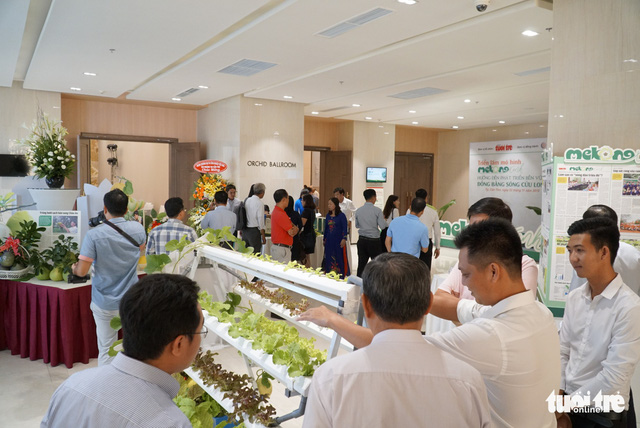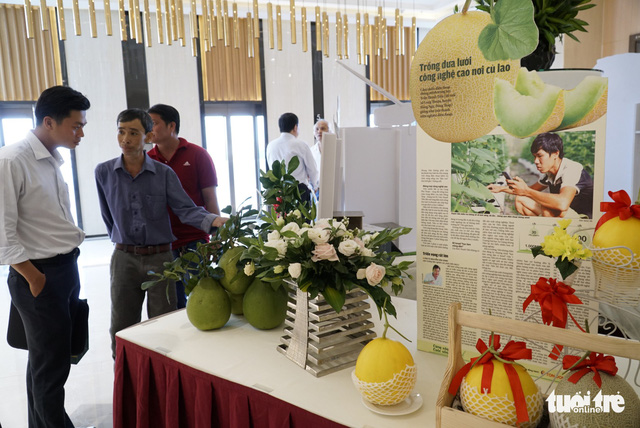More than 100 experts and policymakers participated in a conference hosted by Tuoi Tre (Youth) newspaper in the southern city of Can Tho on Thursday to discuss potential initiatives to combat currents risks faced in the development of the Mekong Delta region as well as ideas to help the area develop sustainably.
The event, “Toward sustainable development of the Mekong Delta,” was held on November 22, one year after Prime Minister Nguyen Xuan Phuc signed Resolution No.120 on sustainable development for the Mekong Delta as part of an effort to cope with climate change in the region.
The resolution sets a vision that over the next 82 years, by 2100, the Mekong Delta will sustainably, safely, and prosperously develop on the foundations of a high-quality agriculture focused economy bolstered by service offerings, ecological tourism, and industry, particularly the processing industry.
At Thursday’s conference, sponsored by Ton Dong A Corporation, a leading coated steel producer in Vietnam, pundits discussed possible measures to materialize the goals and visions of Resolution 120.
Solutions for current risks
Once known as the “rice bowl of Vietnam”, the Mekong Delta, home to more than 17 million people, now faces three major issues – unsustainable flood management, unsustainable land use, and a lack of proper coastal zoning, experts pointed out at the event.
The unsustainable land use, attributed to poor groundwater and sediment management, has resulted in severe subsidence throughout the region, whereas the lack of proper coastal zoning has made the entire area more vulnerable to severe storms and global warming, the pundits elaborated.
Andrew Wyatt, Mekong Delta program manager for the International Union for Conservation of Nature (IUCN), underlined that these risks are exacerbated by climate change and sea-level rise.
Wyatt cited a 2016 study by the U.S. National Oceanic and Atmospheric Administration as a warning that the Mekong Delta is expected to be several meters under sea level at some point in the next few decades.
The subsidence rate in such Mekong Delta provinces as Bac Lieu and Kien Giang, where the unsustainable extraction of groundwater is practiced by shrimp farms built along the local coastline, has reached as high as 2.5 cm per year.
Other participants at the conference agreed with Wyatt that authorities should consider having local farmers adopt sustainable and alternative livelihood options to mitigate flood disasters.
Alternative livelihood is a term referring to interventions that aim to reduce the prevalence of activities deemed as harmful to the environment by substituting them with lower impact livelihood activities that provide at least equivalent benefits.
In the case of the Mekong Delta, instead of doing the third rice crop of the year, it was suggested that farmers change their methods and begin cultivating floating rice crops or make use of their rice area to grow lotus for tourism purpose, which trap more sediments left behind by annual floods.
 |
| Guests examine successful agriculture models on display at the conference in Can Tho, southern Vietnam, on November 22, 2018. Photo: Tuoi Tre |
Data from a study released by IUNC show that intensive shrimp farming is less sustainable in terms of trapping sediment, as it keeps 14.34 cm of sediment per year, not to mention its contribution to subsidence. On the other hand, the alternative model - mangrove-shrimp farm - is more sustainable as it provides organic shrimps and traps 25.13cm of sediment a year.
If the question is how to balance between the income and the long-term future of the Mekong, the answer is clear, Wyatt said.
“We need to move unsustainable intensive shrimp farming away from the coast and replace it with integrated mangrove-shrimp systems for coastal protection,” Wyatt recommended.
“This will reduce ground water pumping and subsidence and help maintain elevations that can respond to sea-level rises by trapping sediments.”
Coastal protection planning needs to move away from the current high risk ‘line of defense’ approach, which means using dykes for anti-flooding, to a more robust ‘zone of defense,’ which involves using integrated mangrove-shrimp systems combined with a 500m strictly protected zone.
Sustainable future to be seen
All of the participants agree that one year after the signing of Resolution 120, it is time for dialogue and discussion to proactively implement the resolution.
Le Minh Hoan, Secretary of the Party Committee of Dong Thap Province, suggested that each of the 13 cities and provinces in the Delta should be more active in taking advantage of all opportunities within the authorized capacity to implement Resolution 120.
Currently, farmers, entrepreneurs, business in the Delta have applied their own creative initiatives to create new products and apply international standards to add more value totheir produce, but these examples are few and far between.
“These are only a few examples of success stories and and we need to utilize their ideas and resources to create a bigger motivation for all involved provinces and cities to be able to bring in a huge transformation for the Mekong Delta,” Hoan said.
Luong Minh Quyet, director of the Department of Agriculture and Rural Development of Soc Trang, said while he agreed that there should be a more proactive approach to realize Resolution 120, it is more important to have a leader to lead all involved parties on the path to resolving the issue.
Prof. Ha Thanh Toan, rector of Can Tho University, proudly introduced the results from his research and cooperation with farmers in the Delta.
He promised that Can Tho university will continue to carry more research as well as transfer its research results to the farmers to help them transform their lives.
Like us on Facebook or follow us on Twitter to get the latest news about Vietnam!

















































